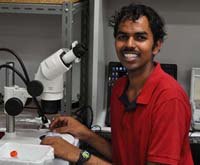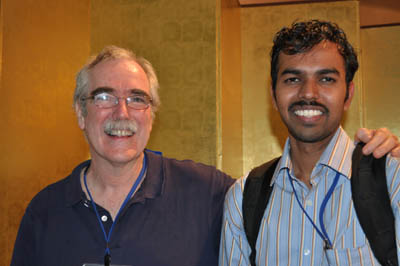Research in the land of rising sun…
Posted by Shreeharsha T Tarikere, on 14 September 2010
I am a graduate student from Indian Institute for Science Education and Research (IISER), Pune, India. I wish to share some of my work and life experiences in Japan from a recent visit. Our lab works on development and evolution of insect wings. I am interested in understanding the development of lepidopteran wings using Bombyx mori ( silkmoth) as a model system. Initially at my place it was an ordeal working experiments mostly for the lack of technical expertise on silkmoth experiments and lack of availability of resources.
We decided to carry out some experiments in the University of Tokyo, Kashiwa campus to study the development and evolution of insect wings, specifically lepidopteran wing development, using the silkmoth as a model organism. Expertise on studies in silkworm development is abundant in Japan as there are many research groups working on this various aspects of silkworm development. To be housed in one of the best universities in asia was a privilege and the facilities and research truly matched the stature of one of the best institutes in the world.

I was in Prof. Haruhiko Fujiwara’s lab which works on Silkworms, Butterflies and different aspects of their genetics and development. The facilities in the lab were really state of the art, organization of the lab was immaculate and expertise vast which helped my work progress smoothly. One hurdle was definitely that of the language which I should admit was a more than what I anticipated, most people in the campus speak in Japanese, study and even discuss science in Japanese, but it seemed trivial with the kind nature of the people, every time they put an effort beyond their way to help you in every situation in lab or on outside. A little Japanese learned beforehand came in handy at times and also got a smile across people there who always appreciated generously for every one of my efforts to speak their language.
I started experiments here as soon as I came in but for a week or so they really did not work as I had to get adjusted to the setup and find the reagents and understand the instruments (some of which had complete Japanese menus!). With the help of the friendly lab members things moved rapidly and was able to understand the techniques they used and apply to solve issues which had troubled me in research so far. In a lab of around 20 people everyone chipped in whenever I had problems to trouble shoot with the best they could and made work progress fast and life easier. The discussions with my sensei (used to address professor in Japanese) were very helpful to understand the development of silkworm and to apply techniques like immuno histochemistry and RNA in situs. As these experiments were done in the lab on a regular basis and also the worms were studied extensively here, hence work moved smoothly and results were easy to come once I was settled in. I could work out all the standardization of Chromatin Immunoprecipitaion (ChIP) with the abundant silkworm resource which was excellently maintained. There wasn’t a single hindrance for an experiment no matter when I wanted to perform them because of the excellent maintenance of the larvae and the whole-hearted support of the lab.
During this trip I also had a golden opportunity to interact with other developmental biologists at the JSDB 2010 meeting at Kyoto. The discussions in the conference included various interesting aspects of developmental biology ranging from growth control, organogenesis to mathematical modeling. The meeting had over 300 poster presentations, where I also got an opportunity to present my work so far and discuss with the best researches in japan and also world-over. It was interesting to discuss with various interesting research projects from japan and other places, also helping understand our own research problems better and flashing some new and interesting insights.

The talks by Prof Eric Wieschaus and Prof Roel Nusse were enlightening and it was really a great opportunity to interact with these scientists, who were very encouraging and made the science more interesting , by inducing many new questions in the mind and also helping our research interests through superlative discussions. apart from the conference Kyoto as a citywas serene and beautiful, having been to Tokyo this part of the world seemed a page from the ancient and rich traditional Japan and a wholly different landscape from what I had seen or imagined.
People in Japan were very kind, polite, peace loving and sweet who helped in every step of my stay. There a lot of international students around especially in my residence where they were very cooperative and were as kind as Japanese themselves. They organized various events from the art of wearing Japanese yukata (traditional Japanese dress) to that of attending the local city festival on weekends. They helped with every problem and also make stay fun filled and enjoyable in every way. Cycling was the best transport in Japan for there were free lanes; it was always fun riding to university through a very beautiful park. For being a vegetarian the other constant problem was food, which I had to cook to survive in a land where nothing was vegetarian. The versatile kitchen facility eased out cooking for my survival and sometimes the vibrant community joined in usually watching football worldcup cheering for Japan or South Korea. It was the charm of the place and people around that made problems gradually melt away etching wonderful memories, easing life and making work enjoyable in a very pleasant ambience.
This visit helped move rapid strides in answering my research question and allowed me to learn newer methods to apply and progress in my research work. I am sure a lot of research problems will be solved and this work will raise new and interesting questions for me to pursue further ahead in research. I hope my experience will encourage more people to work across borders to learn the best from all the great learning centers and Japan in particular, which has people who work really hard and help each other to reach greater heights in their endeavors.
I would like to thank the Development and APDBN fellowships for their encouragement and generous support for my travel and stay in Japan. I would like to thank the Prof Fujiwara and University of Tokyo for the kind invite, support and warm welcome into their facility. My sincere thanks to the lab members of his lab and also other labs which helped and supported to the fullest, whose untiring help and encouragement helped me enjoy both work and stay in Japan. I would like to thank my supervisor Prof. Shashidhara and IISER pune for initiating this interaction and supporting all the way in my graduate study. I would like to thank node for allowing me to share my unforgettable memories of Japan.


 (2 votes)
(2 votes)